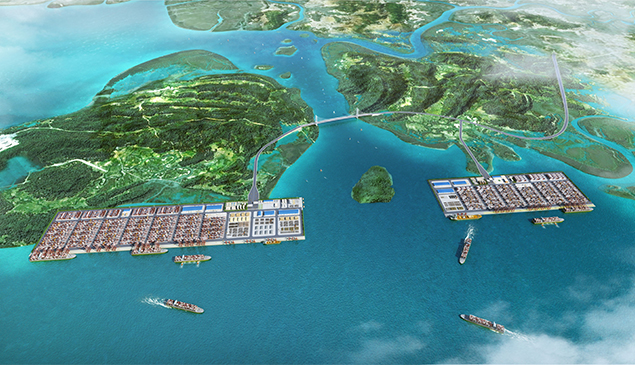On the occasion of Chinese President Xi Jinping's state visit to Myanmar on January 18, 2020, the transaction documents including the Shareholder Agreement and the Concession Agreement on Kyauk Phyu Special Economic Zone (KPSEZ) Deep Sea Port (DSP) Project were exchanged with the witness of President Xi and Myanmar's State Counsellor Daw Aung San Suu Kyi. This marks the actual implementation of an important project of China-Myanmar Economic Corridor (CMEC) under the framework of the Belt and Road Initiative (BRI).
Before the exchange ceremony, CITIC Group's Chairman Chang Zhenming and Myanmar's Deputy Minister of Planning, Finance and Industry U Set Aung inked the two documents witnessed by Permanent Secretary of Myanmar's Ministry of Commerce U Aung Soe, Permanent Secretary of Myanmar's Ministry of Transportation and Communications U Win Khant and China's Economic and Commercial Counsellor Mr Tan Shufu.
According to the agreements, the two sides will incorporate a Joint Venture (JV) to carry out the construction and operation of the project. Previously, to accelerate the project's progress, with authorization from the Management Committee of KPSEZ, start-up works including environmental and social impact assessment (ESIA) and pre-geosurvey have already kicked off.

KPSEZ, consisting of a DSP and an Industrial Park (IP), is one of the pillars under the framework of CMEC. The project is of great significance in boosting Myanmar's economic and social development and deepening economic ties and friendship between Myanmar and China.
As early as in 2009, Xi, as the Vice President of China, witnessed the signing of the MoU of the project. In April, 2017, together with Myanmar's then President U Htin Kyaw, Xi also witnessed the Exchange of Letters of confirming CITIC Consortiums' participation in this project.
During the period of construction and operation, CITIC Consortium will adhere to the guideline of 3Ps, namely “People, Prosperity, Planet” to ensure the project will be socially responsible and environmentally friendly. In accordance with BRI's principle of “extensive consultation, joint contribution and shared benefits”, CITIC Consortium will work closely with its Myanmar counterpart during the whole life circle of the project to improve Myanmar's infrastructure, promote sustainable growth of local economy and create job opportunities and improve livelihood for local people.
Timeline of KPSEZ Project
In 2009, Xi Jinping, as the Vice President of China, witnessed the signing of the MoU on the Cooperation for Kyauk Phyu Economic and Technological Development Zone, Deep Sea Port, Railway Projects in Myanmar.
On September 29, 2014, Myanmar Government started the international tender for the development of the KPSEZ.
On November 24, 2014, CITIC Group, on behalf of CITIC Consortiums, submitted the tender documents for DSP Project and IP Project of KPSEZ respectively to Myanmar Government.
On December 30, 2015, Myanmar Government awarded CITIC Consortiums as bid-winners of both DSP Project and IP Project of KPSEZ.
On April 10, 2017, witnessed by Myanmar's then President U Htin Kyaw and Chinese President Xi Jinping, Exchange of Letters of Implementation of Deep Sea Port Project and Industry Park Project in KPSEZ were signed by CITIC Group, on behalf of CITIC Consortiums and the Management Committee of KPSEZ to confirm CITIC Consortiums' participation in this project, whereby both sides pledged to make joint efforts to advance the agreement and implementation of KPSEZ.
On November 8, 2018, CITIC Group, on behalf of CITIC Consortium, and KPSEZ Management Committee signed the Framework Agreement of KPSEZ DSP Project.
On January 18, 2020, the transaction documents including the Shareholder Agreement and the Concession Agreement on KPSEZ DSP Project were exchanged with the witness of Myanmar's State Counsellor Daw Aung San Suu Kyi and Chinese President Xi Jinping.